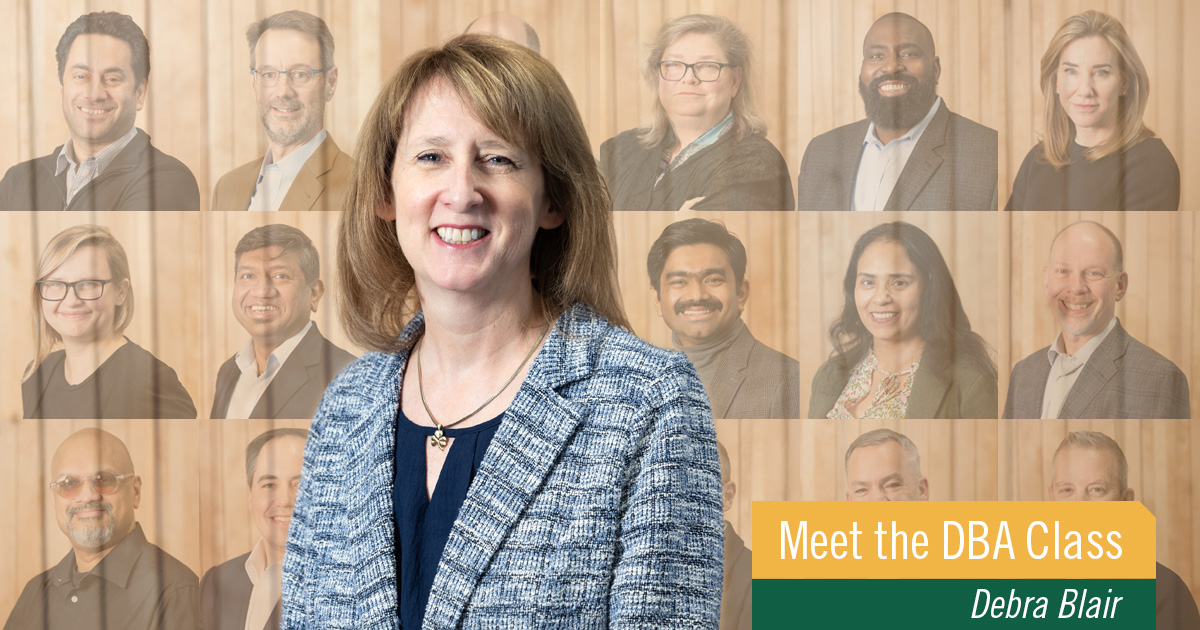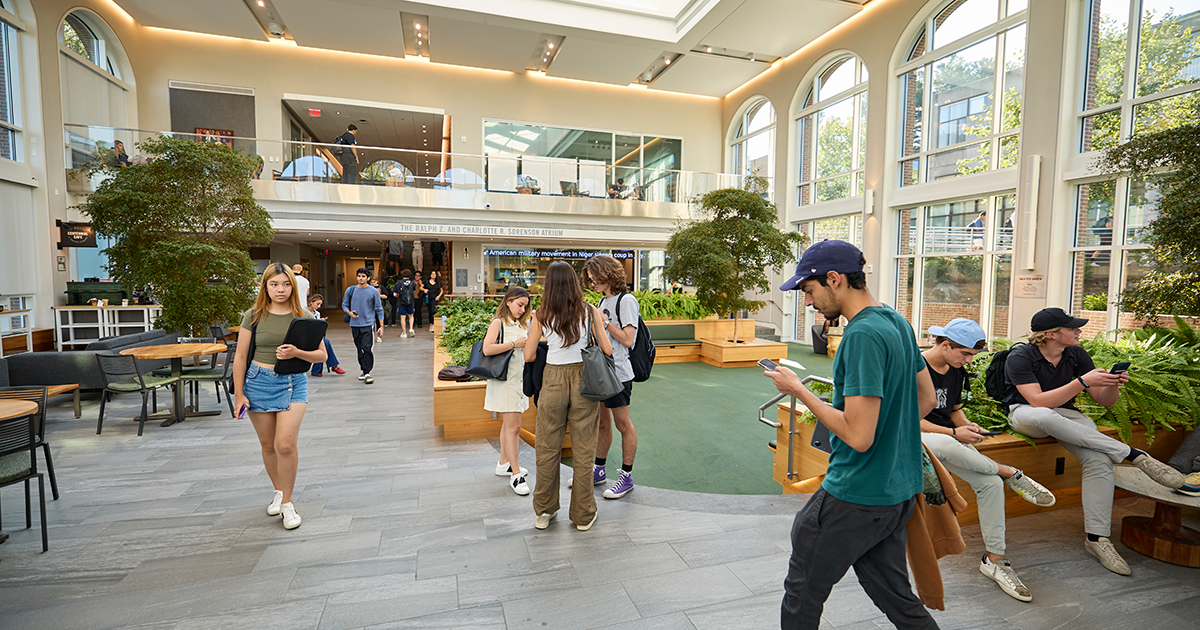In Service of Others: The Power of the Community Action Program
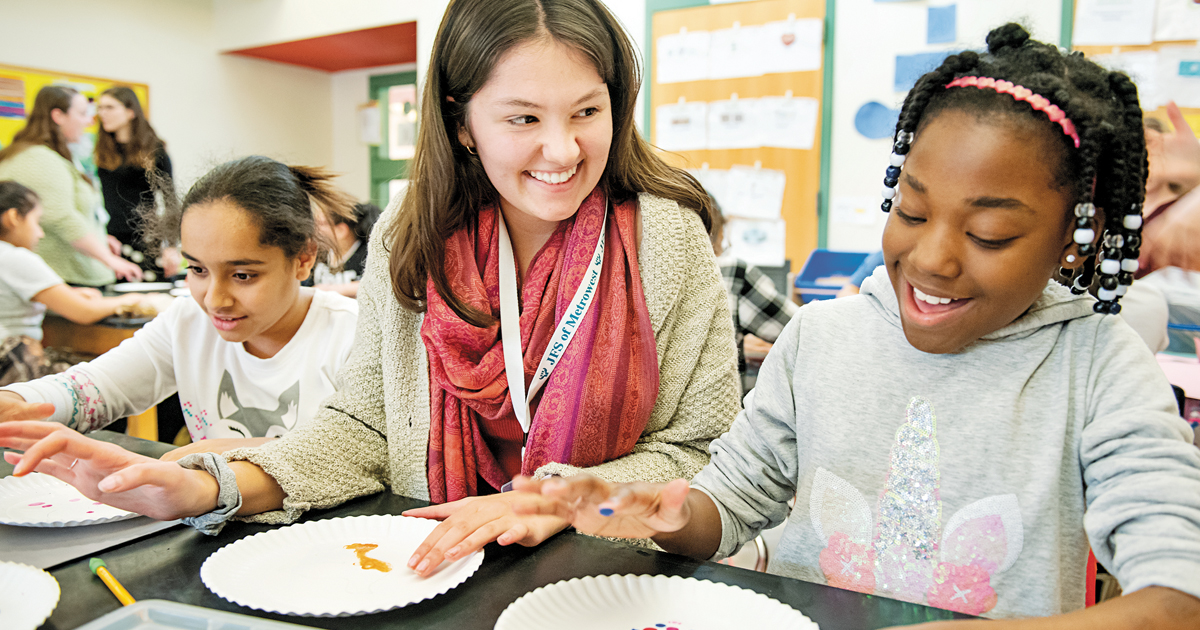
Third-grade students sprinkle into the library just after 4 p.m. on this weekday at Woodrow Wilson Elementary School in Framingham, Massachusetts. Each member of the group—known as All Stars—takes a seat on a colorful carpet at the front of the room.
Directions for the afternoon are discussed, before the group breaks out into smaller groups for learning opportunities. Today’s lesson? Multiplication exercises, “a fun way to practice math,” led by a few Babson College students.
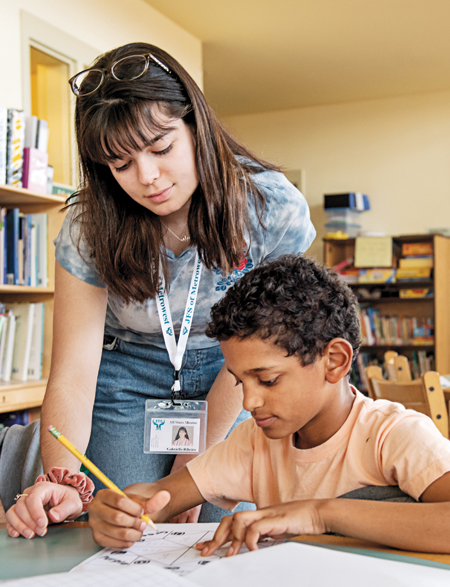
Gabriella Ribeiro ’23 tutors a third-grade student in math at the Woodrow Wilson Elementary School in Framingham, Massachusetts. Photo: Webb Chappell
It’s a weekly ritual for both Babson and Woodrow Wilson students as part of the Community Action Program (CAP). By way of community assistance, youth afterschool, and youth entrepreneurial leadership programs, more than 200 Babson students annually, led by 18 CAP manager liaisons, step away from campus for up to 10 hours each week to educate local elementary students and children, and to better local organizations, towns, and cities.
“A lot of these children go home to empty houses … it’s crucial for them to have access to support,” said Josh Stevenson, associate director of The Lewis Institute’s Service and Justice Programs at Babson. “In a lot of our global communities, they don’t.”
It’s through this service that Babson students mentor and become role models in the lives of children and teenagers in need. Although the less fortunate group of students is the primary focus, these Babson students often also learn a thing or two about themselves in giving back.
“The relationship is reciprocal,” Stevenson said. “The organization we work with is benefiting from our students, but our students are also learning, growing, and developing.”
Validating Volunteering
Michelle Buslov ’20 actively volunteered in community service in high school. But, it has been her work with CAP in which she discovered her inclination to continue to volunteer after graduation and as a working professional.
“Finding (CAP) has helped me validate how important helping others is,” Buslov said. “It has solidified my interest in nonprofit work in my future, and making sure I’m helping those that are less fortunate.
“It’s important for me to do my very best to make them excited about what they’re learning right now, so they see value in going to school every day.”
Abbie vanLuling ’22
“I really wanted something consistent,” she added, “something that would ground me and bring me perspective on a weekly basis.”
With CAP, she has worked in the Musterfield Housing Authority as part of Babson Entrepreneurial Leadership Academies in Framingham, leading groups of children in entrepreneurial and business activities through team building, brainstorming, and idea generation.
“It’s helpful to encourage them to think creatively and outside the box,” Buslov said. “They’re used to being challenged by regular school curriculums.”
Buslov also is a Natalie Taylor Scholar, one of the highest recognitions in terms of social impact on campus. Taylor Scholars participate in 250 hours of community service a year, Stevenson said.
“A lot of these kids don’t have people they can look up to,” Buslov said. “It’s important to have someone to talk to, be there for support. Even just showing up means something to the kids. That consistency is not always there for them.”
Last summer, Buslov interned as a fellow at the Forest Foundation, a Boston organization that funds area nonprofit internships, opening even more doors if she chooses to work for a nonprofit organization after graduation.
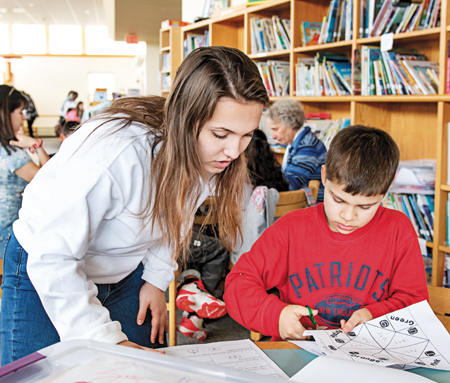
Jacqueline Cornelison ’23 assists third- and fourth-graders as part of the Community Action Program. Photo: Webb Chappell
“I know it’s something I’ll definitely come back to, because I’ve been able to have that experience and see the impact it can have,” she said. “It’s something that’s been instilled in me from a young age; it’s one of my values to take what I have to help others. It brings me joy to do it, but also helps me stay compassionate and understanding.
“The program is a way to bring together people toward a common goal. It can be hard to find other people who are interested in spending time out in the community, doing this kind of work.”
A Reflective Experience
Across the hall at Woodrow Wilson, a small group of fourth-grade students take part in finger-painting activities, supervised by Abbie vanLuling ’22.
VanLuling joined CAP as part of her federal work study, and said she was “amazed” when she learned she could fulfill financial aid by volunteering.
“I knew that’s what I wanted to do,” she said.
At Woodrow Wilson, in the program run by Jewish Family Service of Metrowest, vanLuling has led everything from art and math exercises to hands-on academic projects.
“Finding (CAP) has helped me validate how important helping others is.”
Michelle Buslov ’20
“It’s important for me to do my very best to make them excited about what they’re learning right now, so they see value in going to school every day,” she said. “It’s important that there’s somebody in their life that’s telling them if they try their best, it can help them move closer to becoming the basketball player, the meteorologist, the cellist they say they want to be.”
She says her service is a frequent reminder of how fortunate she is to be a student at Babson.
“When I work with those kids, it reminds me of how lucky I am to be at this institution, and to have the opportunity to go to college,” vanLuling said. “When I get off campus, walk through that school, work with the kids on their math homework, it takes me to this place where I recognize I’m so privileged.”
In CAP, it’s not uncommon for Babson students to ask children what they aspire to be when they grow up, in order to encourage them to set goals for their future.
In one recent instance, the question was turned back on vanLuling. When she didn’t have an answer, a number of children revealed they expected her to become a teacher, an interaction which she described as introspective.
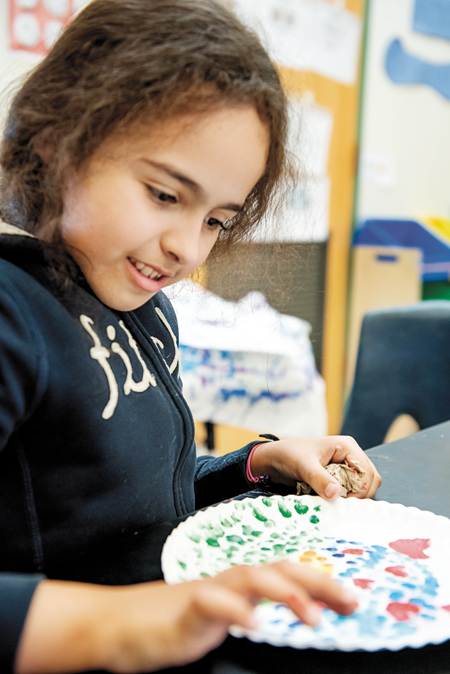
Photo: Webb Chappell
“We can learn from anybody … it’s grounding,” vanLuling said. “For me, every time I come back, I try to encourage a little bit more positivity about the work that we’re doing, the tough aspects about our day-to-day life. … There are people who never even get a chance to get a higher education, or even go to high school.”
‘Developing Empathy’
According to Sebastian Olea ’20, it’s difficult to characterize the situations of local children and teenagers in need unless you experience it firsthand.
“Having someone that can help you out is important to kids,” he said. “Once you see someone that is in need, there should be something done about it.”
Olea has worked with Cradles to Crayons, the Needham Housing Authority Afterschool Program, the Barton Road Afterschool Program in Wellesley, and the Pusan Road Afterschool Program in Framingham.
“You see how other people don’t have the same opportunities that we have here at Babson,” Olea said. “You learn the difficulties people have, and how in their times of hardship, they can teach you stuff, too.”
Through the Babson curriculum and specifically courses such as Foundations of Management and Entrepreneurship, students such as Olea gain compassion by starting a business. Stevenson said during their time as undergraduates, he hopes students find a desire to commit to showing warmth on a more regular basis in CAP.
“The key thing is developing empathy,” Stevenson said. “We’re the No. 1 school in entrepreneurship. When they’re coming up with a business idea, our hope is that they do it with care and concern.”
Stevenson described the role Babson students play in the lives of the less fortunate as “magnificent.” Students such as Buslov, vanLuling, and Olea are some of those attempting to carry that practice forward.
“This is a way to give back while continuing to pursue my goals in life,” Olea said. “The Community Action Program takes your mind off school, but you meet so many different, special people.”
READ MORE: ‘True Success Is Giving Back’ »

Photo: Webb Chappell
Posted in Community


